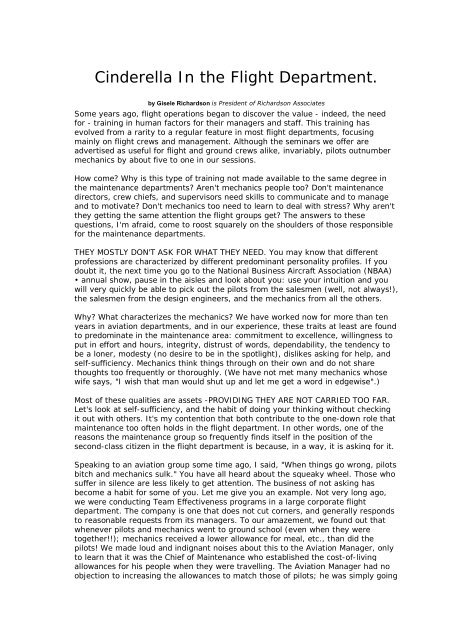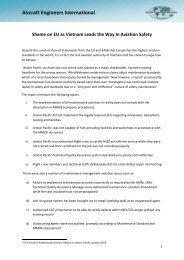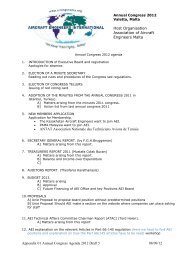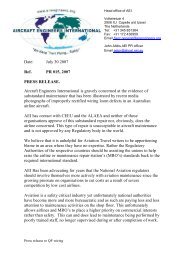Cinderella In the Flight Department - Aircraft Engineers International
Cinderella In the Flight Department - Aircraft Engineers International
Cinderella In the Flight Department - Aircraft Engineers International
You also want an ePaper? Increase the reach of your titles
YUMPU automatically turns print PDFs into web optimized ePapers that Google loves.
<strong>Cinderella</strong> <strong>In</strong> <strong>the</strong> <strong>Flight</strong> <strong>Department</strong>.<br />
by Gisele Richardson is President of Richardson Associates<br />
Some years ago, flight operations began to discover <strong>the</strong> value - indeed, <strong>the</strong> need<br />
for - training in human factors for <strong>the</strong>ir managers and staff. This training has<br />
evolved from a rarity to a regular feature in most flight departments, focusing<br />
mainly on flight crews and management. Although <strong>the</strong> seminars we offer are<br />
advertised as useful for flight and ground crews alike, invariably, pilots outnumber<br />
mechanics by about five to one in our sessions.<br />
How come Why is this type of training not made available to <strong>the</strong> same degree in<br />
<strong>the</strong> maintenance departments Aren't mechanics people too Don't maintenance<br />
directors, crew chiefs, and supervisors need skills to communicate and to manage<br />
and to motivate Don't mechanics too need to learn to deal with stress Why aren't<br />
<strong>the</strong>y getting <strong>the</strong> same attention <strong>the</strong> flight groups get The answers to <strong>the</strong>se<br />
questions, I'm afraid, come to roost squarely on <strong>the</strong> shoulders of those responsible<br />
for <strong>the</strong> maintenance departments.<br />
THEY MOSTLY DON'T ASK FOR WHAT THEY NEED. You may know that different<br />
professions are characterized by different predominant personality profiles. If you<br />
doubt it, <strong>the</strong> next time you go to <strong>the</strong> National Business <strong>Aircraft</strong> Association (NBAA)<br />
• annual show, pause in <strong>the</strong> aisles and look about you: use your intuition and you<br />
will very quickly be able to pick out <strong>the</strong> pilots from <strong>the</strong> salesmen (well, not always!),<br />
<strong>the</strong> salesmen from <strong>the</strong> design engineers, and <strong>the</strong> mechanics from all <strong>the</strong> o<strong>the</strong>rs.<br />
Why What characterizes <strong>the</strong> mechanics We have worked now for more than ten<br />
years in aviation departments, and in our experience, <strong>the</strong>se traits at least are found<br />
to predominate in <strong>the</strong> maintenance area: commitment to excellence, willingness to<br />
put in effort and hours, integrity, distrust of words, dependability, <strong>the</strong> tendency to<br />
be a loner, modesty (no desire to be in <strong>the</strong> spotlight), dislikes asking for help, and<br />
self-sufficiency. Mechanics think things through on <strong>the</strong>ir own and do not share<br />
thoughts too frequently or thoroughly. (We have not met many mechanics whose<br />
wife says, "I wish that man would shut up and let me get a word in edgewise".)<br />
Most of <strong>the</strong>se qualities are assets -PROVIDING THEY ARE NOT CARRIED TOO FAR.<br />
Let's look at self-sufficiency, and <strong>the</strong> habit of doing your thinking without checking<br />
it out with o<strong>the</strong>rs. It's my contention that both contribute to <strong>the</strong> one-down role that<br />
maintenance too often holds in <strong>the</strong> flight department. <strong>In</strong> o<strong>the</strong>r words, one of <strong>the</strong><br />
reasons <strong>the</strong> maintenance group so frequently finds itself in <strong>the</strong> position of <strong>the</strong><br />
second-class citizen in <strong>the</strong> flight department is because, in a way, it is asking for it.<br />
Speaking to an aviation group some time ago, I said, "When things go wrong, pilots<br />
bitch and mechanics sulk." You have all heard about <strong>the</strong> squeaky wheel. Those who<br />
suffer in silence are less likely to get attention. The business of not asking has<br />
become a habit for some of you. Let me give you an example. Not very long ago,<br />
we were conducting Team Effectiveness programs in a large corporate flight<br />
department. The company is one that does not cut corners, and generally responds<br />
to reasonable requests from its managers. To our amazement, we found out that<br />
whenever pilots and mechanics went to ground school (even when <strong>the</strong>y were<br />
toge<strong>the</strong>r!!); mechanics received a lower allowance for meal, etc., than did <strong>the</strong><br />
pilots! We made loud and indignant noises about this to <strong>the</strong> Aviation Manager, only<br />
to learn that it was <strong>the</strong> Chief of Maintenance who established <strong>the</strong> cost-of-living<br />
allowances for his people when <strong>the</strong>y were travelling. The Aviation Manager had no<br />
objection to increasing <strong>the</strong> allowances to match those of pilots; he was simply going
along with <strong>the</strong> Chief of Maintenance's preference!<br />
With that kind of behaviour, is it any wonder that <strong>Cinderella</strong> is pushing out cinders<br />
and garbage in <strong>the</strong> maintenance area while her pilot sisters go to <strong>the</strong> ball in <strong>the</strong>ir<br />
brocade gowns This attitude invites o<strong>the</strong>rs to see mechanics as less important than<br />
o<strong>the</strong>r members of <strong>the</strong> flight department. If you invite people to kick you, <strong>the</strong>re is<br />
bound to be someone willing to accommodate you.<br />
This article is an invitation to mechanics, and especially to <strong>the</strong> managers in <strong>the</strong><br />
maintenance area, to start rethinking how <strong>the</strong>y perceive <strong>the</strong>ir role in <strong>the</strong><br />
department, <strong>the</strong> contribution <strong>the</strong>ir people make to <strong>the</strong> company, and <strong>the</strong> ways <strong>the</strong>y<br />
have at <strong>the</strong>ir disposal to make sure that <strong>the</strong>y are duly recognized.<br />
Space availability prevents our detailing <strong>the</strong> myriad of instances where some clarity<br />
and assertiveness would serve <strong>the</strong> maintenance group well: salaries, working hours,<br />
technical training, and (given our bias) <strong>the</strong> fact that mechanics - like o<strong>the</strong>r human<br />
beings - can benefit from assistance as <strong>the</strong>y find <strong>the</strong>ir way in life, just like <strong>the</strong> rest<br />
of us, whe<strong>the</strong>r or not <strong>the</strong>y are currently in a period of professional or personal or<br />
family crisis. That is to say that employees in <strong>the</strong> maintenance area require<br />
systematic psychological maintenance like <strong>the</strong> rest of us, and will benefit from any<br />
kind of training that enables <strong>the</strong>m to understand human behaviour better, to see<br />
how <strong>the</strong>y unwittingly contribute to some of <strong>the</strong>ir problems, and - most important -<br />
to ensure that <strong>the</strong>y find some ways to become comfortable with more appropriate<br />
behaviour.<br />
The first step, of course, is for management in <strong>the</strong> maintenance area to upgrade<br />
<strong>the</strong>ir own people skills, and to understand how <strong>the</strong>y limit <strong>the</strong>ir ability to use <strong>the</strong>ir<br />
talents, <strong>the</strong>ir experience, <strong>the</strong>ir wisdom, and <strong>the</strong>ir compassion for <strong>the</strong> benefit of <strong>the</strong>ir<br />
people. They need to recognize that <strong>the</strong>y have two roles to play in <strong>the</strong> organization:<br />
to contribute to <strong>the</strong> success of <strong>the</strong> flight department, but also to stand up for, to<br />
defend, to represent, to develop <strong>the</strong>ir own staff. The two are sometimes in apparent<br />
conflict. More importantly, <strong>the</strong> second role too often conflicts with <strong>the</strong> manager's<br />
personal style as described above. Too often, he opts for <strong>the</strong> first at <strong>the</strong> expense of<br />
<strong>the</strong> second.<br />
The mechanic has his 50% of <strong>the</strong> deal too. Does he swallow his frustrations, give up<br />
too easily ("I mentioned it to him once five years ago, but he didn't do anything, so<br />
what's <strong>the</strong> use of bringing it up again"), does he assume - like <strong>the</strong> person who<br />
enjoys being a victim - that "if <strong>the</strong>y really loved me, <strong>the</strong>y would know what I want,"<br />
or does he state his point of view clearly, does he make his frustrations and<br />
satisfactions and preferences known Does he give his boss <strong>the</strong> kind of feedback<br />
<strong>the</strong> boss needs to do his job properly and effectively<br />
Bear in mind that what I am recommending is not revolution but equity and<br />
responsibility. It's a psychological coming-of-age of maintenance people in <strong>the</strong><br />
aviation industry that I am pushing for. It's time to have a bonfire and get rid of<br />
what a friend of mind calls "<strong>the</strong> humble shit" and give to this excellent group of<br />
professionals <strong>the</strong> position <strong>the</strong>y deserve in <strong>the</strong> industry. IT'S LARGELY UP TO YOU!<br />
Ms. Richardson is President of Richardson Associates who has provided human factors training to <strong>the</strong><br />
industry for many years.<br />
Fred Bruggeman<br />
AEI Secretary General





